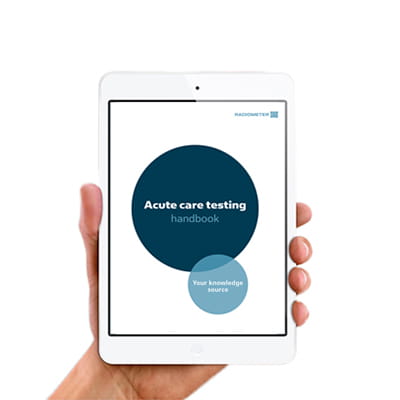Printed from acutecaretesting.org
April 2015
Evolution of pathology services with point-of-care testing in Cornwall
The Royal Cornwall Hospitals Trust, with acute sites at Truro, Hayle and Penzance, covers a wide geographical area, including the Isles of Scilly, and serves around 450,000 people, a figure more than doubled by holidaymakers during the busiest times of the year.
The role of the point-of-care testing team based at the main Trust site in Truro has expanded over the last few years, and recent events have seen strong links established with the Urgent Care Centre (UCC) at the West Cornwall Hospital in Penzance, where the medical staff undertake a variety of time-critical POC tests.
The UCC is a year-long pilot project that was set up to provide ”middle ground” emergency care for patients with minor injuries and acute illnesses living in more remote regions. The Penzance model is unique in the UK and is being followed with interest by other hospital trusts hoping to adopt similar strategies.
The UCC has two components: 24/7 accident and emergency services and a separate urgent care GP clinic, manned by acute GPs employed by the hospital trust, who diagnose, treat and discharge patients when clinically appropriate, reducing unnecessary hospital admissions.
Both services depend on POC testing to speed up the patient pathway without having to wait for results from the pathology laboratory in Truro, and even patients who are then transferred to the main site will have baseline measurements done at the UCC to inform the team receiving the patient; this is particularly relevant for suspected myocardial infarction and DVT in adults, meningitis in children, or patients with acute asthma.
Tests are also carried out on behalf of the two acute medical wards, theaters, outpatient clinics, including the oxygen clinic and the renal unit (for potassium levels), generating as many as 80 samples daily.
Simple and robust care pathways with easy-to-use analyzers have been developed, following detailed evaluation, for a number of measurements, notably blood gases, cardiac (troponin T), clotting (D-dimer) and inflammation (CRP).
The POC blood gas analyzer chosen for the site in Penzance is also found on site at Treliske Hospital in multiple units, and is used to full effect in ITU, the Emergency Department, Medical Admissions, pediatric HDU, the Neonatal Unit and theaters, as well as in the pathology laboratory itself.
A similar system is also used by the Delivery Suite for analysis of very small volumes (35 µl) of fetal blood scalp samples. From performing a significant number of blood gas measurements in the laboratory, there are now only occasional requests, leaving time for other more specialized analyses in a normal day and reducing the overall testing workload for out-of-hours staff.
This makes a great deal of sense for measurements that depend on rapid turnaround; measuring a blood gas on the nearest POC analyzer is typically four times faster than taking a sample to pathology to be processed.
Similarly, the POC immunoanalyzer enables a fast turnaround time for troponin T tests in patients suffering from acute chest pain, allowing acute coronary syndrome to be ruled out without needing to wait for results from the main pathology laboratory and saving on unnecessary admissions.
Based on the success of this service in Penzance, the Clinical Commissioning Group for Cornwall is now considering placing a similar system on the Isles of Scilly so that the GPs based there can offer POC testing for this cardiac marker, potentially making significant savings on unnecessary medical evacuations to the mainland.
Importantly, a laboratory data management tool allows Clinical Biochemistry in Truro to remotely link with the POC analyzers within the main site, as well as at West Cornwall Hospital, and see directly what is displayed on the analyzer.
Biomedical scientists can therefore monitor the data, troubleshoot and advise the system operators in Penzance over the phone should any problems arise, without having to make a round trip of 60 miles to keep the POC analyzers going 24/7. The main pathology laboratory retains overall responsibility and control over ordering supplies to keep the POC equipment running.
CONCLUSION
POC testing has been invaluable for meeting the demands of a changing pathology service at the Royal Cornwall Hospitals Trust. On the main Treliske Hospital site, POC blood gas testing on critical units throughout the hospital has freed up time and resources within the main laboratory and reduced the workload for an already busy out-of-hours service.
Further afield in Penzance, nursing staff take advantage of easy-to-use POC analyzers to provide rapid testing for several time-critical parameters, preventing unnecessary admissions and providing an efficient and effective urgent pathology service for patients in a remote location.
May contain information that is not supported by performance and intended use claims of Radiometer's products. See also Legal info.
Acute care testing handbook
Get the acute care testing handbook
Your practical guide to critical parameters in acute care testing.
Download nowScientific webinars
Check out the list of webinars
Radiometer and acutecaretesting.org present free educational webinars on topics surrounding acute care testing presented by international experts.
Go to webinars








